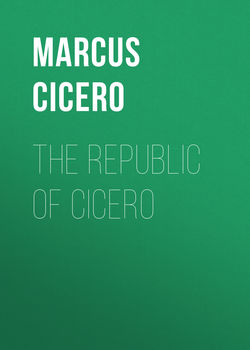Читать книгу The republic of Cicero - Марк Туллий Цицерон, Marcus Cicero - Страница 5
BOOK I
ОглавлениеI. For without the strong feeling of patriotism, neither had G. Duelius, Aulus Atilius or L. Metellus freed us from the terror of Carthage; or the two Scipios extinguished with their blood the rising flame of the second punic war. Quintus Maximus would not have weakened, nor M. Marcellus have crushed the one which was springing up with still greater strength: or P. Africanus turning it from the gates of this city, have borne it amid the walls of our enemies. Yet it was not thought unbecoming in M. Cato, an unknown and a new man, by whom all of us who emulate his course are led as a bright example of industry and virtue, to enjoy the repose of Tusculum, that healthy and convenient situation. That insane man, however, as some have considered him, preferred when urged by no necessity, to contend amid those waves and tempests to extreme old age; rather than pass his days in the most agreeable manner, amid so much ease and tranquillity. Men without number I omit, each of whom were benefactors to the State, and who are not far removed from the remembrance of this generation. I forbear to commemorate them, lest any one should reproach me with neglecting to speak of himself or his immediate friends. This one truth I would mark, that nature has so strongly implanted in man the necessity of virtue, and so powerful an inclination to defend the common welfare, that this principle overcomes all the blandishments of voluptuousness and ease.
II. Yet to possess virtue, like some art, without exercising it, is insufficient. Art indeed, when not effective, is still comprehended in science. The efficacy of all virtue consists in its use. Its greatest end is the government of states, and the perfection not in words but in deeds, of those very things which are taught in the halls. For nothing is propounded by philosophers, concerning what is esteemed to be just and proper, that is not confirmed and assured by those who have legislated for states. For from whence springs piety, or from whom religion? Whence the law, either of nations, or that which is called civil? Whence justice, faith, equity? Whence modesty, continence, the dread of turpitude, the love of praise and esteem? Whence fortitude in trouble and dangers? From those who having laid a foundation for these things in early education, have strengthened some of them by the influence of manners, and sanctioned others by the influence of laws. Of Xenocrates, one of the noblest of philosophers, it is said, that when he was asked what his disciples learnt of him, he replied “to do that of their own choice, which the laws enjoined them to do,” therefore the citizen who obliges every one by the authority and fear of the law to do that, which philosophers by reasoning, with difficulty persuade a few to do, is to be preferred to those learned men who only dispute about these things. For which of their orations, however exquisite, can be compared in value to a well constituted state, to public right and to morals. Truly as great and powerful cities, as Ennius says, are as I think, to be preferred to villages and castles; so those who stand pre-eminent in those cities, in authority and counsel, are to be esteemed far before those in wisdom, who are altogether ignorant of the conduct of public affairs. And since we are chiefly urged by a desire to increase the possessions of the human race, and seek by our counsels and labours, to surround the life of man with gratification and security, and are incited by the instincts of nature to these enjoyments; let us hold the course which was always that of the best men: nor attend to those signals which speculative philosophers make from their retirement, to allure back those who are already far advanced.
